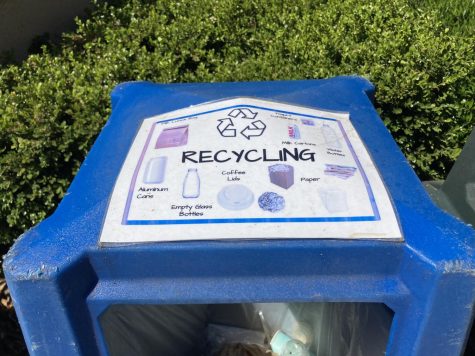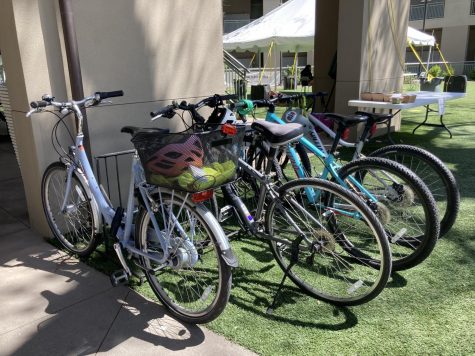Menlo Makes Efforts To Be More Sustainable
Students are encouraged to be environmentally-friendly through the student council, club campaigns and environment-themed student events like EcoAct Week. Staff illustration: Sophie Fang.
June 12, 2021
Sustainable schools offer increased benefits for students and staff, the school itself and the planet. Schools that utilize green practices, such as sustainably sourced materials, more efficient mechanical systems and environmentally-friendly design compared to conventional schools are considered sustainable. A study by Greening America’s Schools found that these schools saw 87% reduced absenteeism, 74% ability to attract and retain teachers and 72% improved community image. This same study also determined that sustainable schools save about $70 per square foot because of direct and indirect savings like cold and flu reduction, indoor ventilation improvements, and energy emissions.
According to the Menlo School website, Menlo’s sustainability goals have three focuses: tracking and decreasing resource consumption, raising community awareness of environmental issues and providing tactical support for green programs in the school community.
To fulfill these goals, Director of Sustainability Chrissy Orangio has implemented various initiatives. One of these is the Go Menlo program. Go Menlo encourages students and teachers to take the bus, train or to carpool, thereby decreasing the number of cars on campus and the carbon dioxide output. Although it is currently suspended because of COVID-19 precautions, in the past the program offered rewards for taking alternative transportation, like donuts.
Orangio has also tried to expand Menlo’s waste-sorting program. According to Orangio, if just 10% of a recycling bin has been contaminated by food or other products, everything in that bin goes to landfill. The only Flik lunch items that can go into the recycling are the Flik lunch bags, which are seldom used, meaning that most of the recycling ends up being contaminated. “All of that waste ends up in the landfill and then it creates more methane and carbon dioxide,” Orangio said.

To combat this, Orangio has worked with facilities to put handmade signs of Flik-specific materials on top of each bin. She’s also promoted a “Bring Your Own Fork” campaign through student council Instagram posts and weekly student emails. Through the student-led Climate Coalition, students are also encouraged to bring their own utensils for lunch so they don’t use the single-use ones provided by the school.
Although the waste-sorting program has been somewhat effective, Orangio hopes to implement a system where student sorters stand next to the bins to guide and encourage other students to put their waste in the correct receptacle. These sorters would also be standing in high traffic areas on campus to direct trash clean-up after lunch is over. A similar initiative was implemented by the Climate Coalition in previous school years, but was cancelled due to COVID-19 concerns. “This is the only successful thing I’ve ever seen in the 15 to 20 schools I’ve worked with,” Orangio said.
Campaigns concerning school sustainability are brought to attention through student clubs, such as the Climate Coalition, as well as environment-themed student events such as EcoAct week. During EcoAct week, students engaged in various activities related to climate change to raise awareness of issues affecting the environment.
Another way students can become more environmentally aware is through the Environmental Science class taught by Orangio. In the class, students learn about how natural disasters have impacted sustainability as well as their own impact on the environment. They also propose solutions to important current global environmental issues.
For next year, Orangio’s sustainability goals are centered around constantly reminding students of their environmental responsibilities until it becomes a habit. She intends to do this through signage and incentives. “It needs to be a school-wide effort,” Orangio said.
According to Orangio, the bottom line is that students need to take a few seconds out of each day to do small actions that can contribute to the environment immensely, like placing their forks into the right trash bins. “The most important thing is student behavior,” Orangio said.




